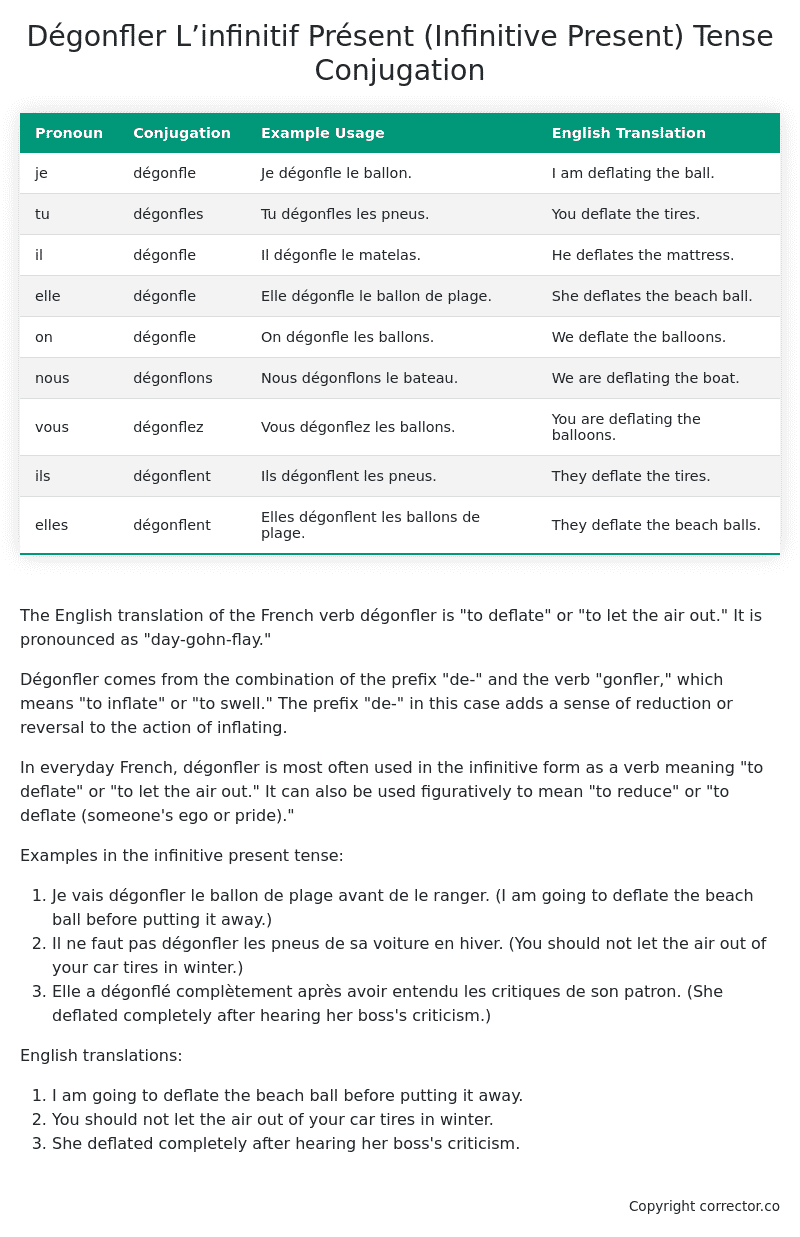L’infinitif Présent (Infinitive Present) Tense Conjugation of the French Verb dégonfler
Introduction to the verb dégonfler
The English translation of the French verb dégonfler is “to deflate” or “to let the air out.” It is pronounced as “day-gohn-flay.”
Dégonfler comes from the combination of the prefix “de-” and the verb “gonfler,” which means “to inflate” or “to swell.” The prefix “de-” in this case adds a sense of reduction or reversal to the action of inflating.
In everyday French, dégonfler is most often used in the infinitive form as a verb meaning “to deflate” or “to let the air out.” It can also be used figuratively to mean “to reduce” or “to deflate (someone’s ego or pride).”
Examples in the infinitive present tense:
- Je vais dégonfler le ballon de plage avant de le ranger. (I am going to deflate the beach ball before putting it away.)
- Il ne faut pas dégonfler les pneus de sa voiture en hiver. (You should not let the air out of your car tires in winter.)
- Elle a dégonflé complètement après avoir entendu les critiques de son patron. (She deflated completely after hearing her boss’s criticism.)
English translations:
- I am going to deflate the beach ball before putting it away.
- You should not let the air out of your car tires in winter.
- She deflated completely after hearing her boss’s criticism.
Table of the L’infinitif Présent (Infinitive Present) Tense Conjugation of dégonfler
| Pronoun | Conjugation | Example Usage | English Translation |
|---|---|---|---|
| je | dégonfle | Je dégonfle le ballon. | I am deflating the ball. |
| tu | dégonfles | Tu dégonfles les pneus. | You deflate the tires. |
| il | dégonfle | Il dégonfle le matelas. | He deflates the mattress. |
| elle | dégonfle | Elle dégonfle le ballon de plage. | She deflates the beach ball. |
| on | dégonfle | On dégonfle les ballons. | We deflate the balloons. |
| nous | dégonflons | Nous dégonflons le bateau. | We are deflating the boat. |
| vous | dégonflez | Vous dégonflez les ballons. | You are deflating the balloons. |
| ils | dégonflent | Ils dégonflent les pneus. | They deflate the tires. |
| elles | dégonflent | Elles dégonflent les ballons de plage. | They deflate the beach balls. |
Other Conjugations for Dégonfler.
Le Present (Present Tense) Conjugation of the French Verb dégonfler
Imparfait (Imperfect) Tense Conjugation of the French Verb dégonfler
Passé Simple (Simple Past) Tense Conjugation of the French Verb dégonfler
Passé Composé (Present Perfect) Tense Conjugation of the French Verb dégonfler
Futur Simple (Simple Future) Tense Conjugation of the French Verb dégonfler
Futur Proche (Near Future) Tense Conjugation of the French Verb dégonfler
Plus-que-parfait (Pluperfect) Tense Conjugation of the French Verb dégonfler
Passé Antérieur (Past Anterior) Tense Conjugation of the French Verb dégonfler
Futur Antérieur (Future Anterior) Tense Conjugation of the French Verb dégonfler
Subjonctif Présent (Subjunctive Present) Tense Conjugation of the French Verb dégonfler
Subjonctif Passé (Subjunctive Past) Tense Conjugation of the French Verb dégonfler
Subjonctif Imparfait (Subjunctive Imperfect) Tense Conjugation of the French Verb dégonfler
Subjonctif Plus-que-parfait (Subjunctive Pluperfect) Tense Conjugation of the French Verb dégonfler
Conditionnel Présent (Conditional Present) Tense Conjugation of the French Verb dégonfler
Conditionnel Passé (Conditional Past) Tense Conjugation of the French Verb dégonfler
L’impératif Présent (Imperative Present) Tense Conjugation of the French Verb dégonfler
L’infinitif Présent (Infinitive Present) Tense Conjugation of the French Verb dégonfler (this article)
Struggling with French verbs or the language in general? Why not use our free French Grammar Checker – no registration required!
Get a FREE Download Study Sheet of this Conjugation 🔥
Simply right click the image below, click “save image” and get your free reference for the dégonfler L’infinitif Présent tense conjugation!

Dégonfler – About the French L’infinitif Présent (Infinitive Present) Tense
Forming the Infinitive Present
Common Everyday Usage Patterns
As a Verb’s Dictionary Form
After Modal Verbs
As an Imperative
In Infinitive Clauses
Interactions with Other Tenses
Present Tense
Future Tense
Conditional Tense
Passé Composé
Imperfect Tense
Subjunctive and Conditional Moods
Summary
Want More?
I hope you enjoyed this article on the verb dégonfler. Still in a learning mood? Check out another TOTALLY random French verb conjugation!


